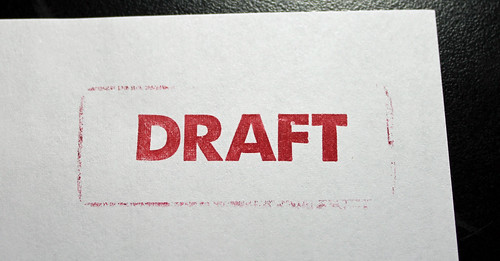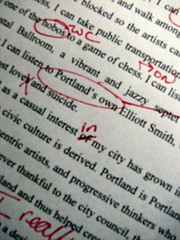Because I don’t.
Don’t get me wrong. All of my books (well, that I want to publish, anyway) have a second draft. In fact, I just finished one. I think every book—yes, every.single.one—needs at least a second draft. (Mine have a bare minimum of seven.)
I just think the term “writing” a second draft is . . . odd. When we talk about “writing” the first draft, we mean pounding out those 70,000 brand new words (because my first drafts are almost always 70,000 words, strangely) one after the other. By that standard, it seems like “writing” a second draft would mean setting aside those words and starting over to write out 70,000 new ones. (Or more; my first 3-5 drafts grow up to 30%.) Possibly it might mean using those words as a guide, perhaps in another window of your program, as you start a fresh document, writing the book from scratch again.
Does anybody out there do that?
To be clear, I’m not really referring to the necessary restructuring a discovery writer/pantser might face after a first draft. I mean people who have a structurally okay-ish manuscript in need of lots of work, of course, as all first drafts are.  Do we really just throw those words away?
Do we really just throw those words away?
That seems ridiculous to me.
Certainly, my manuscript changes drastically from the first draft to the second. Literally no scene is untouched. Some scenes may be restructured in major ways. Some, I realize, are missing altogether. A few (more than a few this time around) may be in the wrong place.
But I just can’t fathom the idea of starting over from scratch. Because even if you’ve written the novel once before, it seems to me you’re just going to end up with exactly what you had before: a messy first draft.
So, no, I don’t “write” a second or third or fourth draft of a novel. I revise, rewrite, edit and polish those drafts. But I only “write” the book (hopefully!) once.
Do you “write” a second draft?
Photo credits: DRAFT—Jeffrey Beall; garbage—Sebastien Wiertz

 So when we’re
So when we’re 
 But man, when that idea strikes, it’s hard to make myself do the normal day-to-day, keeping-the-house-clean, being-a-mom stuff. All I want to do is write, and yet no matter how fast I write (my record is 5000 words in a day), it’s not fast enough. The rest of the book stretches out in front of me, scenes and lines and snippets that threaten to slip away before I can get there. So I race on.
But man, when that idea strikes, it’s hard to make myself do the normal day-to-day, keeping-the-house-clean, being-a-mom stuff. All I want to do is write, and yet no matter how fast I write (my record is 5000 words in a day), it’s not fast enough. The rest of the book stretches out in front of me, scenes and lines and snippets that threaten to slip away before I can get there. So I race on. For me, that’s stuff I can add later, in each layer of editing. In fact, I’m taking this week off drafting to go back to the first MS I wrote during this year to add in more of those descriptions and sensory information, since the second half of the book is rather bereft of those (silly me, thinking all the character and setting descriptions were established in the first half, and we wouldn’t need anymore after that!).
For me, that’s stuff I can add later, in each layer of editing. In fact, I’m taking this week off drafting to go back to the first MS I wrote during this year to add in more of those descriptions and sensory information, since the second half of the book is rather bereft of those (silly me, thinking all the character and setting descriptions were established in the first half, and we wouldn’t need anymore after that!).